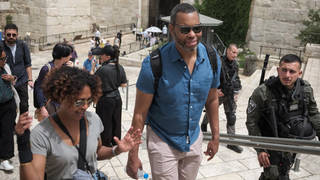
Amid a communications blackout in Gaza, we are able to reach Palestinian journalist Akram al-Satarri in Rafah, where much of Gaza’s population is now displaced near the Egyptian border as Israel intensifies its assault on the besieged territory. The overall death toll in Gaza has now topped 21,000, including over 8,000 children, and Israeli leaders have suggested the war could continue for months. “The situation is dire,” says al-Satarri, who describes continuous airstrikes leveling buildings as Gaza residents live in terror, not knowing when, where or why Israeli bombs will fall. “It’s a continuous struggle to live. It’s a continuous struggle to survive.”
Transcript
AMY GOODMAN: We’re going to a Barnard professor, but we just learned that we’re joined now, if we can reach him, by Akram al-Satarri, a Gaza-based journalist, talking to us from Rafah in southern Gaza. It’s so hard to get him, that we want to go directly to him, if in fact he’s on the line.
Akra, are you there?
AKRAM AL-SATARRI: Yes, I’m there.
AMY GOODMAN: Thank you so much for being with us.
AKRAM AL-SATARRI: Good morning.
AMY GOODMAN: Can you just tell us what’s happening right now in Rafah and in southern Gaza?
AKRAM AL-SATARRI: Well, it’s extremely difficult to describe how difficult and futile the situation in southern Gaza, Rafah and Khan Younis area, in particular. The area has been subjected to a complete shutdown of all communication system and a comprehensive jam of all communication, including the eSIMs, that the Israeli authorities learned that the Palestinians using to take and [inaudible] the truth to the world.
The [inaudible] is heavier than ever. Every few seconds, a very heavy bombardment, very large destruction. I have just learned that the Palestinian Red Crescent Society, Al-Amal Hospital — “al-amal” means “hope” — Al-Amal Hospital was just hit, and 22 people were killed because of that bombardment. And the Israeli occupation army is still bombarding the whole area, in Rafah, in Khan Younis, in Deir al-Balah, in the Gaza central area, in Nuseirat, al-Maghazi, al-Bureij and also Juhor ad-Dik area. So, it’s a very heavy — and it’s a very heavy, sustained [inaudible] one-ton missiles, two-ton missiles are hitting the houses and destroying whole blocks sometimes.
JUAN GONZÁLEZ: Can you talk — how difficult — I can’t imagine how difficult it is for you as a journalist working in Gaza to be able to report. Could you talk about some of the problems that you face?
AKRAM AL-SATARRI: Well, one of the problems that I’m facing is that this complete lack of communication. We scheduled a meeting for your good service. It was supposed to be starting around two hours ago. And because of that complete, complete blackout of the communication, I could not join you.
To the [inaudible] becomes the first and the most priority. Journalists are people. Journalists are fathers. Journalists are brothers. Journalists are mothers. Journalists are [inaudible]. And, trust me, I personally have been struggling to live. I’ve been moving from one area to another. I was asked to move from where I live to another place. Then I was asked to move from that place to another place. For the whole Palestinians and journalists, in particular, this is extremely [inaudible]. Survival becomes the first priority. [inaudible] You don’t know when they’re going to hit. You don’t know who they’re going to hit. You don’t know the reason of why they’re hitting. But you might end up being targeted by them.
Now you see the people walking down the street. It’s like people are going nowhere certain. They are confused. They are in fear because of the ongoing bombardment. And they end up killed even when they’re walking, when they’re sleeping, when they’re trying to secure the food. The situation is dire.
And when it comes to the journalists, I was today in Nasser Hospital in Khan Younis, Nasser Medical Complex. I saw the journalists waiting because they don’t have any communication whatsoever. They have been struggling to secure whatever connection they can. They, I — me and three other journalists were like [inaudible] hospital in the hope that we would find connection, find internet connection. We went down. We were trying. Now, we could not make a connection until a few seconds ago, when I could do a connection, thanks to one international eSIM that I have.
So, it’s a continuous struggle to live. It’s a continuous struggle to survive. And it’s a continuous struggle to secure the very basic need of journalists and their families, as well. So it’s no more a professional duty, so a professional and a humanitarian duty, as well. And the journalists are torn apart between their duty towards their families and their duty also toward their career.
AMY GOODMAN: So, why do you do it, Akram al-Satarri? Akram? Well, it looks like we lost Akram al-Satarri. We’re going to try to get him back on, and we’re going to post that interview at democracynow.org. He is a Gaza-based journalist, incredibly brave, very difficult to get this connection, talking to us from Rafah in southern Gaza.












Media Options